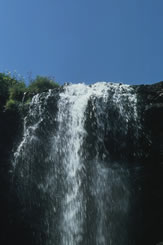 Hydroinformatics - Modelling and Information Systems for Water Management : Part of International Master Programme in Water Science and Engineering
Hydroinformatics - Modelling and Information Systems for Water Management : Part of International Master Programme in Water Science and Engineering
Participants in this specialisation will learn how to solve problems of hydraulics, hydrology and environmental engineering for better water management using simulation modelling and other tools. They will also become acquainted with models applied to water-based systems, learn to design and integrate decision support systems, and develop the skills to provide expert advice to managers and users of advanced tools.
Start next run: October 20101
Duration: 18 Months
Location: UNESCO-IHE, Delft, the Netherlands
Hydroinformatics - Modelling and Information Systems for Water Management is the study of the flow of information related to the flow of water (and all that it transports) and the interactions with its natural and artificial environments.
It involves mathematical modelling and advanced information technology tools, and their application to hydraulic, hydrological and environmental problems of urban, inland and coastal waters and provides the computer-based, decision-support systems that are revolutionising traditional planning, design and decision-making methodologies.
A hydroinformatics system also allows an expert user to factor-in the physical, social and environmental consequences resulting from any action on a water body, as well as constraints expressed in natural language (legislation, contracts, agreements etc.) and to merge these with measured data, making results available to hydro-scientists and engineers in the form of computer-based, environmental impact assessment and decision-support systems.
1) dates, duration and location may vary in joint programmes
Participant Profile
Hydroinformatics engineers participate in defining, building and supplying the tools that enable decision-makers to manage aquatic resources and the environment. They work with engineers, scientists and people from other interest groups.
The hydroinformatics course is designed for hydraulic, environmental and water resources engineers from universities, consulting firms, research institutes, water boards and other government agencies.
The typical participant uses or advises others in the use of mathematical models and hydroinformatics systems for planning, designing or managing the aquatic environment.
A good knowledge and experience of hydraulics and hydrology is essential. Participants should preferably have a BSc in civil or environmental engineering and be able to compensate for any weakness in numerical analysis and computational hydraulics. Participants may also come from other engineering, mathematics or applied science backgrounds, and they should be able to compensate for any weakness in hydraulics during the course.
Graduates of this specialisation develop an ability to investigate and solve complex problems. They are able to work independently and in teams, and they have good communication skills.
Learning Objectives
By the end of the course graduates will:
- Have a good understanding of the fundamentals of a range of physical processes, advanced modelling techniques and information technology for water management.
- Be able to select and use simulation models applied to water-based systems in a wide variety of hydraulic, hydrologic and environmental engineering situations.
- Be able to use current software tools, and know their advantages and limitations.
- Know how to design, develop and integrate decision-support systems and tools.
- Be able to provide advice to managers and users of advanced tools.
- Understand and practice collaborative work, making use of Internet-based platforms.
Graduates will be able to work in practical water sector environments that require academic qualifications and skills. Graduates who obtain good study results will be eligible to continue with a PhD study in hydroinformatics at universities and institutes worldwide. Just over a third of our hydroinformatics graduates continue to a PhD degree.
Course Contents
This specialisation provides academic education in fundamental hydroinformatics, basic hydraulic, hydrologic, water quality and environmental processes, and the fundamentals of computer sciences and software engineering. It covers geo-information systems and use of the Internet. Participants develop an understanding of physically-based and data-driven modelling and modelling techniques.
They learn how to conduct systems analysis, and to use optimisation and decision-support tools and techniques. Participants receive hands-on training in using software tools in several application areas. They learn to understand the broader role of hydroinformatics in society.
The specialisation modules deal with the following subjects:
- Geo-information systems covers information and communication technology, GIS and remote sensing, and information acquisition and treatment. Participants carry out practical GIS applications related to aquatic systems and learn to develop water related software.
- Computational hydraulics and information technology includes mathematical formulation of fluid flow equations, database, information and knowledge systems and numerical methods.
- Modelling theory and applications further develops numerical methods, and covers river modelling, modelling theory and modelling system development. Participants program computer code, build a river flood model, and design and build a simple modelling system.
- Computational intelligence and control systems covers real time control of water systems, optimisation theory and programming, and data driven modelling and computational intelligence. Participants sketch a plan for a regional real-time control system, and pose a modelling problem, build a model and test it.
- River basin modelling covers river basin management, groundwater and catchment modelling. Participants study the multi-purpose nature of river basins and approaches for integrated planning and management, and use MODFLOW , NAM and MIKE-SHE software to simulate surface and groundwater flow and rainwater run-off.
- Hydroinformatics for Decision Support covers system analysis in water resources planning and management, optimization, use different types of decision support methods, integration of data and models, both as stand-alone and Internet-based.
In addition, participants choose one of the following modules:
- Coastal modelling,
- Urban modelling
- or Flood modelling.
The list below shows all course modules of the specialisation within the framework of the International Master Programme in Water Science and Engineering (participants can choose between modules that have the same module-number). This is followed by a six month research and thesis phase. In total, the programme covers a period of 18 months and graduates will be awarded 106 ECTS (European Credit Transfer and Accumulation System) credits.
Modules
Module: 1/Credits: 5
Module: 2/Credits: 5
Module: 3/Credits: 5
Module: 4/Credits: 5
Module: 5/Credits: 5
Module: 6/Credits: 5
Module: 7/Credits: 5
Module: 8/Credits: 5
Module: 8/Credits: 5
Module: 8/Credits: 5
Module: 8/Credits: 5
Module: 8/Credits: 5
Module: 8/Credits: 5
Module: 8/Credits: 5
Module: 8/Credits: 5
Module: 9/Credits: 5
Module: 10/Credits: 5
Module: 10/Credits: 5
Module: 10/Credits: 5
Module: 10/Credits: 5
Module: 10/Credits: 5
Module: 10/Credits: 5
Module: 10/Credits: 5
Module: 10/Credits: 5
Module: 10/Credits: 5
Module: 11/Credits: 5
Module: 11/Credits: 5
Module: 11/Credits: 5
Module: 11/Credits: 5
Module: 11/Credits: 5
Module: 12/Credits: 5
Module: 13/Credits: 3
Module: 14/Credits: 7
Hydroinformatics and Natural Resources Management - Ain ShamsThe Hydroinformatics and Natural Resources Management programme is jointly offered by the Ain Shams University and three European universities; UNESCO-IHE Institute for Water Education (UNESCO-IHE) in Delft, The Netherlands, Exeter in the UK and Algarve University in Faro, Portugal....
International Masters in Hydroinformatics - HohaiThe International masters in Hydroinformatics (IMHI) is a joint educational programme o...
International Master in Hydroinformatics - Universidad Del ValleThe International Master in Hydroinformatics programme is jointly offered by Universidad Del Valle and UNESCO-IHE Institute for Water Education (UNESCO-IHE)....
| Contact information | n/a |
|---|---|
| News type | Inbrief |
| File link |
http://www.unesco-ihe.org/Education/MSc-Programmes/MSc-in-Water-Science-and-Engineering/Hydroinformatics-Modelling-and-Information-Systems-for-Water-Management |
| Source of information | UNESCO-IHE |
| Keyword(s) | Hydroinformatics |
| Subject(s) | ANALYSIS AND TESTS , CHARACTERISTICAL PARAMETERS OF WATERS AND SLUDGES , DRINKING WATER , DRINKING WATER AND SANITATION : COMMON PROCESSES OF PURIFICATION AND TREATMENT , HYDRAULICS - HYDROLOGY , INFORMATION - COMPUTER SCIENCES , MEASUREMENTS AND INSTRUMENTATION , METHTODOLOGY - STATISTICS - DECISION AID , POLICY-WATER POLICY AND WATER MANAGEMENT , TOOL TERMS , WATER QUALITY |
| Relation | http://www.emwis.net/topics/fol668523 |
| Geographical coverage | Netherlands, |
| News date | 03/08/2010 |
| Working language(s) | ENGLISH |
 you are not logged in
you are not logged in





